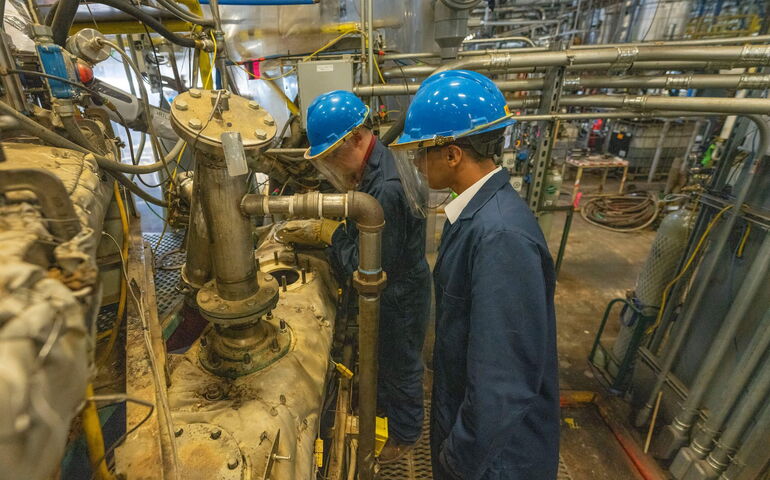USDA grant will help UMaine team turn forest products into jet fuel, fish feed
 Photo / Courtesy, University of Maine
Travis Glatter and Ehsan Sardar are shown working last month at the Technology Research Center in Old Town, part of the University of Maine Forest Bioproducts Research Institute.
Photo / Courtesy, University of Maine
Travis Glatter and Ehsan Sardar are shown working last month at the Technology Research Center in Old Town, part of the University of Maine Forest Bioproducts Research Institute.
Researchers at the University of Maine have received a $10 million federal grant to investigate the use of low-value wood to make two products that might seem unusual: jet fuel and fish feed.
Wood contains organic compounds called lignins that can be converted into fuel and sugars that can be fermented into fish feed proteins, the Orono school explained in a news release.
Low-value wood includes small-diameter trees and branches. Pulp and paper producers are fewer of Maine's forest resources, so there there's a surplus available for other uses.
UMaine’s Forest Bioproducts Research Institute and Aquaculture Research Institute were awarded the $10 million grant by the U.S. Department of Agriculture to fund the investigation.
Collaborators on the research are the University of Massachusetts Lowell, the USDA's Agricultural Research Service and Arbiom, a North Carolina and France-based manufacturer of protein ingredients for human and animal food.
“The new funding is key to developing creative and sustainable markets for underutilized forest biomass while prioritizing the inclusive values that are important to advancing equitable rural development in Maine,” said Clayton Wheeler, director of UMaine's Forest Bioproducts Research Institute.
The sugars, lignin and other biomass components from the wood will be separated by the Forest Bioproducts Research Institute and converted to protein by Arbiom using a proprietary microbial fermentation process.
The proteins will then be formulated into fish feed by the Agricultural Research Service in collaboration with the Aquaculture Research Institute, which will conduct studies on the feed's digestibility and growth impact in salmon.
Lignin and other byproducts of the sugar production will be upgraded by the Forest Bioproducts Research Institute to create a sustainable form of aviation fuel, using a process called hydrothermal liquefaction. It employs high-temperature and high-pressure water to break down the solid residues into organic liquids.
UMass Lowell will use artificial intelligence-based predictive modeling for the fuel research. The modeling could predict the product’s effectiveness under different operating conditions and chemical compositions of the woody biomass.
Developing new products using wood that has been considered waste could generate additional revenue streams, maximize the value of the forestland, avoid changes in the land use, and spur more effective forest management, UMaine said in the news release.












0 Comments